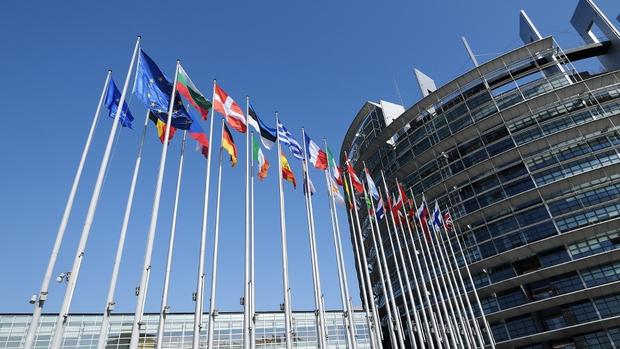 Flags of European Union member states fly in front of the Louise Weiss building (right), headquarters of the European Parliament in Strasbourg, eastern France, on July 1, 2019. (FREDERICK FLORIN / AFP)
Flags of European Union member states fly in front of the Louise Weiss building (right), headquarters of the European Parliament in Strasbourg, eastern France, on July 1, 2019. (FREDERICK FLORIN / AFP)
BRUSSELS/GENEVA - European Union (EU) member states agreed on Wednesday to revise rules on the protection of privacy and confidentiality in the use of electronic communications services.
The original proposal was presented by the European Commission back in 2017.
The European Council said in a statement that the agreement paves the way for negotiations with the European Parliament on the final text of the new rules which will repeal the previous directives.
Portugal's Infrastructure and Housing Minister Pedro Nuno Santos, president of the European Council, said that robust privacy rules were vital for creating and maintaining trust in a digital world
The revised rules will define cases in which service providers are allowed to process electronic communications data or have access to data stored on end-users' devices.
ALSO READ: EU privacy law heralds new era in online data protection
Portugal's Infrastructure and Housing Minister Pedro Nuno Santos, president of the Council, said that robust privacy rules were vital for creating and maintaining trust in a digital world.
"The path to the Council position has not been easy, but we now have a mandate that strikes a good balance between solid protection of the private life of individuals and fostering the development of new technologies and innovation," he said.
Portugal is holding the rotating presidency of the Council of the EU.
An update to the existing ePrivacy directive of 2002 is needed to cater for new technological and market developments, such as the current widespread use of voice over IP (VoIP), web-based email and messaging services and the emergence of new techniques for tracking users' online behavior. The mandate also covers rules on online identification, public directories, and unsolicited and direct marketing, the Council said.
Protection against online child sex abuse
As the global community marked Safer Internet Day on Feb 9, UN human rights experts have called on the EU to "close the legal gap" in children's protection from sexual abuse online.
The fact that there currently exists no legislation within the EU that allows for the technology companies to detect and report child sexual abuse online is very concerning to me.
Mama Fatima Singhateh, UN special rapporteur on sale and sexual exploitation of children
In a press release issued on Wednesday, Mama Fatima Singhateh, UN special rapporteur on sale and sexual exploitation of children, was quoting as saying: "The fact that there currently exists no legislation within the EU that allows for the technology companies to detect and report child sexual abuse online is very concerning to me."
If no agreement is reached on temporary legislation to allow for the continued use of technological tools to tackle such abuse, "many children will continue to be abused with impunity with no hope in sight for assistance," she said.
READ MORE: Europol: Online child sex abuse rises with COVID-19 lockdowns
Joseph Cannataci, UN Special Rapporteur on the right to privacy, called on the EU member states to "review their legal frameworks to enable voluntary action by companies to lawfully and proportionately detect online child sexual abuse."
The call for action came in the wake of a recent law enforcement survey conducted by tech company NetClean, which confirmed that the COVID-19 pandemic has led to a global increase in online child sexual abuse crime, the press release said.
Europol, the EU's law enforcement agency, has also warned of "increased activity relating to child sexual abuse and exploitation".


